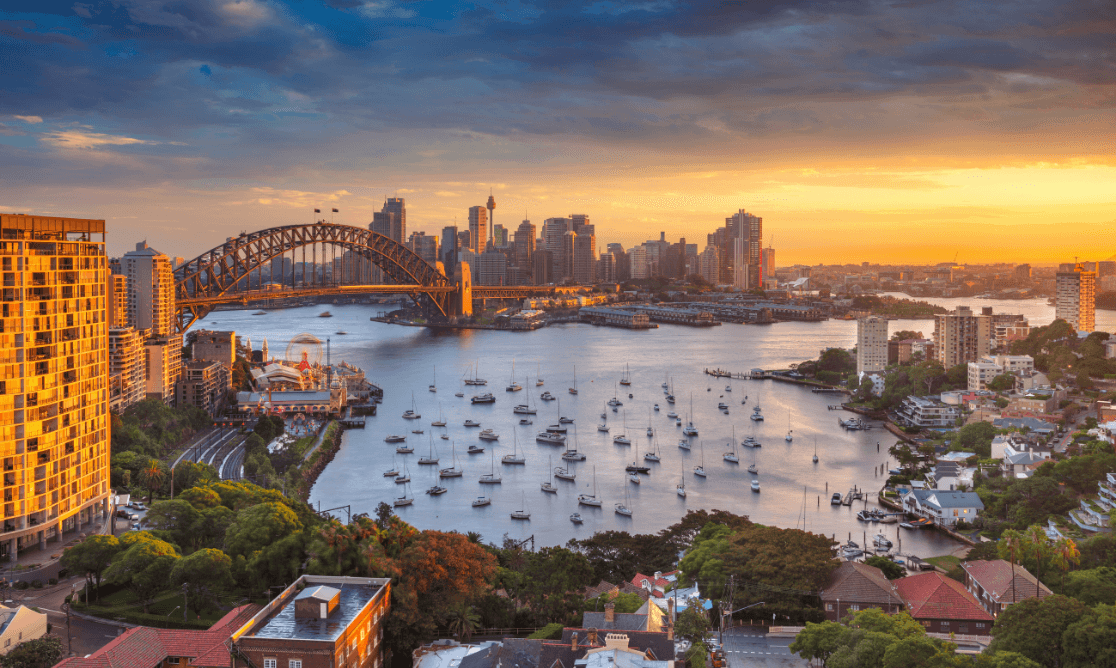- Quickly pick up some useful stats to familiarise yourself with the Sydney property market.
- Discover key market, economic and demographic trends, as well as rental yields, for Sydney.
- Get answers to some popular Sydney property investment questions.
Looking to buy or invest in property in Sydney? We've crunched the numbers, so you don't have to!
Read on for everything you need to know about the Sydney property market.

In this guide

Unloan Variable Home Loan (Owner)
Interest rate (p.a.)
5.99%
Comp rate^ (p.a.)
5.90%
Max LVR
80.00%
Application fee
$0.00
Monthly repayment
$2,695.08
Total repayment
$970,228.80
Highlights
- Get a rate discount every year.
- No application fees, no account fees, and no exit fees.
- Borrow up to 80% of your home’s value.
- Refinancing only.
Market trend statistics
Sydney is in Australia’s first place in terms of property market growth, reflected by a positive increase of 25.5% over the past 12 months. The median house value is currently sitting at $1,333,767 and the median unit value at $837,262.
The demand for apartments is not as strong as the demand for houses. However, it should be mentioned that Sydney is a rare case in its high housing demand. That’s not to say that units closer to the CBD won’t perform well, as both investors and owner-occupiers are still interested.
The dramatic rise in property prices has not prevented the region from being a seller’s market. The prediction of only upward growth has caused there to be more buyers than sellers. Consequently, the auction clearance rates have consistently exceeded 80%.
With the annual number of property sales for NSW being 191,090 in 2021 so far, it can be estimated that a substantial number of sales come from Sydney. At least 50% of the homes sold in Sydney in 2021 were over the $1 million mark. Sydney also holds the title of the fastest-selling housing market. Each property spends on average only 28.5 days on the market, and in some regions this can be as low as 18.5 days.

Million dollar market
Half of the homes sold in Sydney in 2021 cost at least $1 million.
Sydney’s average rental yield
If you’re a property investor, you will naturally be concerned with rental yield. It is calculated over the entire year and is expressed as your rental income on a property as a percentage of the value of the property. All values given refer to gross rental yield.
The average rental yield for all houses in Sydney in November 2021 sat at 2.2%. The value for three-bedroom houses specifically is slightly higher at 2.4%.
The average rental yield for all units in Sydney is 3.5%. The value is slightly higher for two-bedroom units specifically, at 3.4%. Over the past decade, the yields have decreased by approximately 1.5%.

A new low
Sydney and Melbourne investors are getting the lowest rental yields in Australia.
Economic and demographic trends
There are approximately 5.4 million people residing in Greater Sydney, and 1.8 million residences. The projected population for the year 2036 is approximately 6.6 million.
Inner-city Sydney has a population of around 17,000 people. The average age ranges from 20-39, which may explain why 67% of the residents are in single-person households. Around 31%6 of the properties are owner-occupied while the remainder are tenants/renters.
In the inner city, 69% of the labor force works full-time. Around 94% of the population (of the appropriate age) are employed. This qualifies as an excellent socio-economic profile.
The top five employment types include:
- Professional, Scientific, and Technical Services
- Accommodation and Food Services
- Financial and Insurance Services
- Health Care and Social Assistance
- Education and Training
The weekly median household income is $1,933, while the median mortgage repayment sits at $2,500. The median rental payment is around $600.
Many jobs were lost to the pandemic. As a result, a COVID recovery plan was put in place. The community recovery plan for Sydney involves a dedicated 18-month plan aimed at supporting economic and social recovery for the area.
It takes into account feedback from the community and builds on the existing $72.5 million in support packages.

Boom or bust?
Sydney's population is projected to bloom to 6.6 million by the year 2036.

Unloan Variable Home Loan (Investor)
Interest rate (p.a.)
6.29%
Comp rate^ (p.a.)
6.20%
Max LVR
80.00%
Application fee
$0.00
Monthly repayment
$2,782.44
Total repayment
$1,001,678.40
Highlights
- Get a rate discount every year.
- No application fees, no account fees, and no exit fees.
- Borrow up to 80% of your home’s value.
- Refinancing only.
FAQs
Where is the best place to buy an investment property in Sydney?
In general, there is no one suburb that can ever be labelled the best for investing in property. However, some suburbs have affordable investment properties while exhibiting great year-on-year growth in value. One such suburb is North Epping, regarded as one of Sydney's best suburbs for investors.
The median price for a three- bedroom house is $1,555,000, with an average rental yield of 2.11%. The year-on-year change in the median sale price is a substantial 39%.
What is the most affordable suburb in Sydney?
The cheapest suburbs in Sydney (located within 20km of the CBD) are Lakemba, Wiley Park, Guildford, Punchbowl, and Harris Park. They all have median property prices below $500,000.
Are Sydney house prices falling?
Sydney house prices are projected to increase over the coming years. This is from the high demand causing it to behave as a seller’s market. Some individual property prices may drop in price. However, the median property price will increase.
What income do you need to earn to buy a house in Sydney?
To comfortably afford the mortgage repayments, the average Sydney household should earn at least $177,155. This will vary depending on the mortgage needed and the repayment amounts and specific interest rates.
Making the most of the property trends
The massive growth in the Sydney property market can make you feel as if you’re missing out if you’re not investing, and at times this drives up demand. As a result, the perceived value of properties goes up, and they sell for close to the asking price.
Review this impartial statistical data with a neutral eye and make decisions based on your unique financial situation. Make sure you are in a position to get a home loan easily and with a good interest rate before diving in.
Remember to also adopt a property evaluation strategy that suits you (since many different ones exist). It should be a mix of objective facts as well as the subjective data you get from residents in the area. Stay well informed and you should find that you have no struggles standing by your decisions.

Found your Sydney dream home?
Talk with a mortgage broker
A Sydney mortgage broker can help you through the home loan application process. Schedule a meeting today

